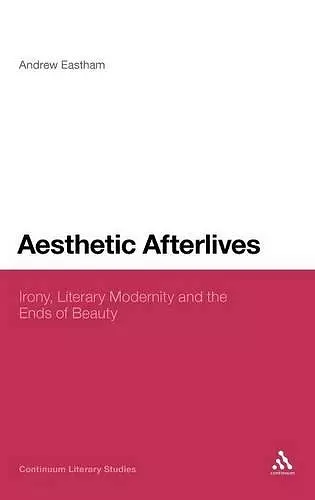Aesthetic Afterlives
Irony, Literary Modernity and the Ends of Beauty
Format:Hardback
Publisher:Continuum Publishing Corporation
Published:6th Oct '11
Currently unavailable, and unfortunately no date known when it will be back

Examining some of the most important debates in post-Romantic aesthetics through highly focused textual readings of authors from Walter Pater and Henry James to Samuel Beckett and Alan Hollinghurst, this title investigates the dialectical position of irony in Aestheticism and Modernism.This an original theoretical reading of the emergence of British literary modernity, beginning with Victorian Aestheticism and tracing its afterlives into the 21st Century. Since the development of British Aestheticism in the 1870's, the concept of irony has focused a series of anxieties which are integral to modern literary practice. Examining some of the most important debates in post-Romantic aesthetics through highly focused textual readings of authors from Walter Pater and Henry James to Samuel Beckett and Alan Hollinghurst, this study investigates the dialectical position of irony in Aestheticism and Modernism. "Aesthetic Afterlives" constructs a far-reaching theoretical narrative by reading this dialectical condition back from the end of the twentieth century to the Victorian fin de siecle and to the emergence of Modernism. Referring to the recent debates about the 'new aestheticism' and to Ranciere's work on the politics of aesthetics, Eastham asks how a utopian Aestheticism can be reconstructed from the problematics of irony and aesthetic autonomy that haunted writers from Pater to Adorno.
Aesthetic Afterlives traces the lineage of Paterian aesthetics from its incandescent impact within English fin de siècle culture to its spectral “afterimage” in modernist and postmodernist writing […] Ambitious in scope, broadly researched and elaborately (if densely) argued, Eastham’s book will prove of immense use to scholars anxious to reanimate an alternative line of influence in the history of literary modernity. * Naomi Milthorpe, University of Tasmania, Australia *
Aesthetic Afterlives makes an invaluable contribution to our understanding of Aestheticism’s cultural legacy, with its powerful and eloquent account of Aestheticism’s afterlives not only in literary modernism, but also in postmodernism and contemporary culture. * Hugh Stevens, University College, London, UK *
What is so striking about Aesthetic Afterlives is the way in which, having established some of the theoretical coordinates that formed the matrix of Aestheticism, it does justice to the rich complexity of affective and aesthetic interactions, including mourning, scorn, irony, yearning, faith and delusion, that mutate through the broad range of texts Eastham considers. * Alex Pestell, University of Sussex, UK *
ISBN: 9780826443984
Dimensions: unknown
Weight: unknown
272 pages